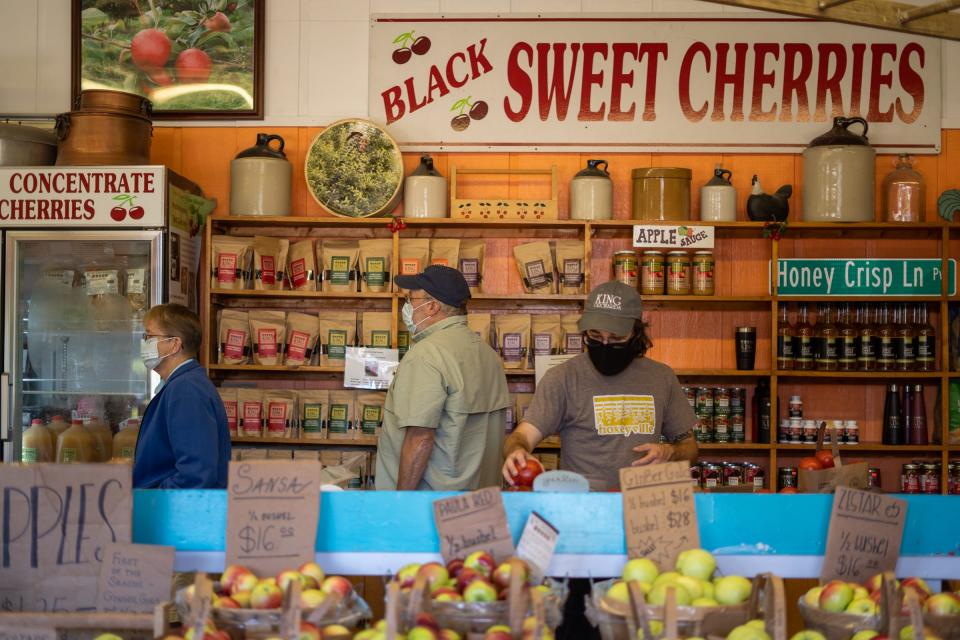Michigan cherry farmers could lose jobs, livelihoods amid tough competition from overseas
They’re a treasured old-time sight in Michigan — cherries and the miles of orchards where they flourish Up North.
Michigan is the nation’s top producer of tart cherries, for great pies and jams; and ranked fourth for sweet cherries, sold in city markets nationwide and at rural roadside stands along Lake Michigan.
Michigan's cherry juice has a big following as a health food and sport supplement, with fans at retirement centers and in the locker rooms of the Detroit Red Wings, Green Bay Packers and other pro teams.
But this season, there’s a new market for Michigan cherries: Voters.
A campaign ad for U.S. Senator Gary Peters features a bearded Michigan farmer, speaking out on why the state’s cherry growers are up against a threat worse than the much-feared hail, ravaging insects and labor shortages that have long given cherry farmers sleepless nights.
Now they have a fresh nightmare: Ultra-cheap cherries from Turkey. It's a gripe familiar to countless Michiganders who've lost jobs to imported just-about-everything-else.
In Peters' ad, cherry grower Nels Veliquette praises the senator for helping his industry battle the cheap imports.
“Sen. Peters was the one guy that showed up from the very beginning,” Veliquette narrates, over scenes of farmers on tractors and cherries glowing red on trees, then bouncing down conveyor chutes. “He came to the factory, he listened to the growers, he listened to the processors.”
The 60-second ad also has Peters talking, briefly making the growers’ case against “unfair prices.”
Veliquette’s dried tart cherries, plump and chewy, are sold at Meijer, Spartan stores and other markets under the name Shoreline Fruit. His grievance may at first seem unrelated to the woes of Americans displaced from manufacturing. But it's a refrain that goes back decades in Michigan, where hundreds of thousands of auto, steel and other jobs have been lost to low-cost imports.

Aside from cherries, Veliquette says that Peters cares about the little guy — “the small towns, the small problems,” the ad says, because he cares about anyone whose job might disappear. The ad shows Veliquette on a deck, scanning cherry orchards from his acreage in Grand Traverse County, which happens to be a stronghold of Republicans.
Peters' cherry spot has been broadcast statewide since early August. It surely was seen by GOP strategists.
It might have helped nudge Vice President Mike Pence into making a surprise visit in late August to Traverse City, the heart of Michigan’s cherry country. To a crowd of 400 spirited supporters at Cherry Capital Airport, Pence touted the Trump administration’s support for jobs and better trade deals while repeatedly plugging Peters’ Republican opponent, Army veteran and business executive John James.
More: In one of the more nastier races, John James and Sen. Gary Peters offer different styles
As much as Peters is identified as a champion of cherry farmers, concern for this traditional industry in Michigan is bipartisan. Farmers on both sides of the political divide are struggling. And most any long-time visitor to northern Michigan would regret seeing the state's serene hillsides of cherry orchards, floating above Lake Michigan's blue waters, turn into anything else.
In Michigan’s generally conservative orchard country, not a few cherry growers and processors line up behind President Donald Trump and James.
Of course, Veliquette, the star in the TV ads, is a big Peters booster. Sitting at a picnic table early this month, rimmed with a horizon of his fruit trees, while his son Axel, 9, built tiny cabins with sticks, Veliquette said the imported cherries and their juice concentrate could destroy his livelihood and the jobs of countless Michigan picking and processing workers, just as surely as other Michiganders lost jobs to Chinese tools and housewares, Japanese steel and Mexican auto parts.
Peters has "done more for us than anyone," says Veliquette, although he cites support that also came from another Democrat — Debbie Stabenow, Michigan’s other U.S. senator and former chair of the powerful Senate Agriculture Committee — as well as from Michigan's Republican members of the U.S. House of Representatives.
More: Many suburban women in Michigan have message for Trump: We want security, not chaos
Yet now, after years of complaining, and after Veliquette and other growers spent $2 million in legal fees last year pursuing their case against cheap imports, and after Peters was captured on film at the White House telling Trump that Michigan’s cherry farmers need protection from unfair trade — with Trump agreeing enthusiastically — the growers got nowhere.
They were stymied by an adverse ruling of the U.S. International Trade Commission early this year, which forced Veliquette to say in the ad not that the growers won, only that “Gary’s got our back.” Not even Peters leading a bipartisan effort could influence the trade commission ruling.
All that leaves Veliquette and other growers saying the future of Michigan's cherry belt is in the hands of consumers. He implores: Read labels; check for country of origin; ask store managers and even restaurants, "Are these cherries from the USA?"
“I’m talking about all kinds of cherries. I’m a tart cherry grower, but you should ask about all the cherries you buy. Because once you stop asking, the big companies will just start buying the cheapest cherries they can get,” he said.
A short drive from Veliquette’s picnic table are the two roadside stores of King Orchards, separated by a few miles in the gorgeous area between Lake Michigan and Torch Lake, south of Charlevoix and north of Elk Rapids.

The stores are stocked with fresh fruit and vegetables galore, all locally grown, although even after cherry season ended in mid-August a recent visitor couldn't miss King Orchard's cherry-centric inventory: pies, jams, dried cherries, chilled juice concentrate, cherry salsa, pie filling and more.
The struggle with cheap imports has turned neighbor against neighbor, co-owner John King said.
Like a new truck for $10K
“Some of our competitors right here in this county sell cherries from Turkey and Poland. The big fight is with dried cherries. They’re dumping them in at 20% of our cost,” he said.
The price difference seems shocking, almost unbelievable. That same gap in a car showroom would be like buying a loaded, full-sized import pickup for $10,000.
Evidence shows that Turkey’s government is heavily subsidizing its cherry industry, said Julie Gordon, president of the Cherry Marketing Institute, based in DeWitt near Lansing. The trade group has about 500 growers of tart and sweet cherries, many of whom grow both.
After filing a lawsuit last year, pushing for tariff protection, the tart growers at first had the upper hand. Four growers in Michigan, including Veliquette and one in Utah, filed a petition requesting import duties that would have amounted to more than $5 a pound on dried cherries, which Turkish exporters had been selling for less than $1 a pound, according to industry trade journals.
Their lawsuit triggered an investigation by the U.S. Department of Commerce, which found more than two dozen subsidy programs available to Turkish tart cherry producers, including export subsidies for dried cherries, incentives for farmers to plant fruit tree saplings, and one government hand-out providing 50% of the capital cost of new cherry processing facilities, according to documents obtained by the Free Press.
The evidence seemed compelling. And, sure enough, a year ago the U.S. cherry growers gained a favorable ruling from staff analysts at the all-powerful U.S. International Trade Commission. Unfortunately, the good news didn’t last. In January of this year, the agency’s panel of commissioners reversed the staff’s ruling, voting to do nothing, deciding that imported cherries were doing no harm to the domestic industry, Gordon said.
“The case was turned because they used the numbers that importers gave them, and not our U.S. numbers,” Gordon said.
An appeal would end up before the same commissioners.
“We invested over $2 million in that case and to appeal it, we just don’t have that kind of money,” she said.
Peters, in news coverage at the time, called the ruling “a wrong decision (because) they were basically using data from the Turks, which made no sense." He reacted by asking the U.S. Commerce Department to start collecting official government data from the American cherry industry, which would carry at least as much weight as the Turkish data given to the commissioners. The Commerce Department agreed to start doing that as of July 1, according to Peters' Washington office.
In a statement that Peters' staff sent to the Free Press, Peters said: “I’m pleased we were successful in pushing the International Trade Commission to start tracking Turkish cherry imports more accurately. . . . As we work to hold foreign competitors accountable, I will keep fighting to create a level playing field to protect our cherry growers in Michigan."
Based on past elections, Peters' Senate opponent has an edge in cherry country, where roadside signs tell drivers to vote Republican in November because “Socialism = Slavery.” But Michigan's first-term senator has credibility with Gordon.
“I think his commercial did so well because he’s been an advocate for our industry for quite a while,” she said. Michigan's Republican House members have been good supporters too, Gordon added.
Still, Peters was the only member of Congress to testify in person at the Trade Commission’s hearing, while other Michigan politicians submitted letters of support, said Elizabeth Drake, a partner in a Washington, D.C., law firm that argued the cherry growers' trade case. Stabenow submitted a letter of support, and there was a joint bipartisan letter from Michigan House members, Drake said.
Of big help to the cherry industry over the years have been several Republican Congressmen from northern Michigan — Reps. Jack Bergman, Bill Huizenga and John Moolenaar, said Ben LaCross, co-owner of LaCross Farms, a family firm northwest of Traverse City. LaCross is prominent with the Michigan Cherry Committee, a product promotion group.
As much as Peters has become identified as a champion of cherry farmers, and as well as his campaign staff turned that into an appealing television ad, concern for this treasured traditional industry in Michigan is clearly bipartisan. Even fudgies and snowbirds whose only tie to northern Michigan is as a place for recreation and relaxation can find themselves looking doe-eyed at the rolling hills of orchard country leading to the blue waters of Lake Michigan, and wanting nothing more than to have nothing about it change.
Juice, to your health
Many Michigan farmers raise a style of tart cherry called Montmorency, which isn’t grown in Turkey. Michigan growers say Montmorency cherries, named after a valley in France, not after the county in northern Michigan, are the only type that can make health claims, not Turkey’s different style.
Among those claims? That Montmorency cherry juice, consumed with water because it's just too tart to drink straight, speeds recovery from workouts, promotes deeper sleep, boosts the immune system, eases gout symptoms and improves memory in people with mild dementia -- although more research is needed to confirm the claims, according to the Medical News Today website.

As good as all that sounds, Turkey’s tart cherries and cherry juice are so cheap that they could ultimately flood U.S. markets, pushing Michigan growers to switch, not fight. Many could change to growing sweet cherries and other crops, as Isaiah Wunsch is doing on his family’s farm that goes back more than a century.
At almost the northern tip of Old Mission Peninsula, which runs for 19 miles up the picturesque center of Grand Traverse Bay, Wunsch, 33, sat outside a 19th-Century farmhouse where his great-grandparents once lived and said he'd looked hard at the future.

“We used to be the biggest tart cherry producer on Old Mission. Because of market conditions (Turkish competition), we’ve removed most of our tart cherry orchards and replaced them with apples and sweet cherries,” Wunsch said. Peaches, too.
Just a day after the Free Press visited, Peters made a surprise visit on his Harley-Davidson Dyna Super Glimotorcycle to the Wunsch farm, where 20 growers had gathered. After they talked, the host sent Peters and his staff on their way with a bag of Wunsch Farms' peaches.
A day earlier, Wunsch told a reporter that farmers who depend on tart cherries are being loyal to "an industry that’s kind of on the ropes." Being on the ropes is a sadly familiar status for many kinds of American farms, the most publicized losers being small dairy farms that are disappearing like stars at dawn. What's less known is that Michigan's cherry farms are almost as perishable.
Eight miles north of Elk Rapids, with views of Lake Michigan from bluffs on U.S.-31, is Good Nature Farm. Andrew Kamp, 28, recently inherited the 227 acres of orchards after his father, worn down by stress, died last year at 63, Kamp said. The property is for sale.

“His debt on the farm was just too much. It just wasn’t feasible to keep things going,” Kamp said.
Already, weeds are chest high around the cherry trees and the farmyard is deserted, while Kamp works as a welder.
So, did Turkish cherries play a role?
“Definitely. The cherry market is 90% of the reason I’m selling,” Kamp said.
Short of selling out, one survival tactic for cherry farmers is finding a market niche, one that supports the higher cost of raising American cherries without government aid. One niche has been to grow organic cherries.
Yet, even there, American producers are being stung by imports. An investigation in next month's “Consumer Reports” magazine, checking years of data from the U.S. Department of Agriculture, says many samples of Turkish cherries labeled “U.S.D.A. certified organic” actually contained pesticides. The magazine, in a carefully worded sentence perhaps intended to dodge a potential lawsuit, concludes: “In recent years, questions have been raised about the integrity of the organic label on Turkish imports.”
But a lawyer for the Cherry Marketing Institute near Lansing didn't pull any punches. The U.S. grants the “organic” label to Turkish producers merely upon payment of a licensing fee, she said. And a Free Press check of online sellers found that numerous cherry juice products carry the green USDA organic logo, but merely say they're packaged in the U.S., failing to say where the fruit came from.
More: 2020 National Cherry Festival in Traverse City canceled over coronavirus concerns
More: Little Bohemia in Traverse City announces permanent closure in wake of COVID-19
In Frankfort, Cheryl Kobernik co-owns 40-acre North Star Organics, where she and her husband raise what are truly organic cherries, as verified regularly by inspectors from the Michigan Agriculture Environmental Assurance Program. Her cherries are ideal for consumers willing to pay for premium products and even do some picking themselves.
By shunning pesticides, Kobernik loses 5 to 15% of each crop to insects, she said. And this year, bad weather made her crop so scanty, she didn't bother to hire mechanical "shakers" for harvesting. Still, on opening day of her U-pick season, July 22, "we had 1,000 people come through," Kobernik said. So, North Star will survive this year's meager harvest, and it will survive attacks of the spotted wing drosophila, a fruit fly from Southeast Asia that began infesting Michigan's cherry trees in 2010.

Besides the U-pick crowd, Kobernik does a big business online, resulting in steady demand. In fact, she said, "We can't produce enough."
But she's worried about other farmers, and not just those growing cherries. If Americans would check labels and spend 5-10% more to buy U.S.-grown food, "we'd save a lot of our smaller farms," she said, speaking as a steering committee member of the non-profit Wyoming-based Rural American 2020.
"I firmly believe in rural America. Cherries are wonderful. But the industry is so stressful. There's more and more bankruptcies," Kobernik said.
As far as Turkish cherries and other imports go, she said, "I'm just not understanding our government's decision."
Contact: blaitner@freepress.com.
This article originally appeared on Detroit Free Press: Election 2020: Struggling Michigan cherry farms see new market: voters

